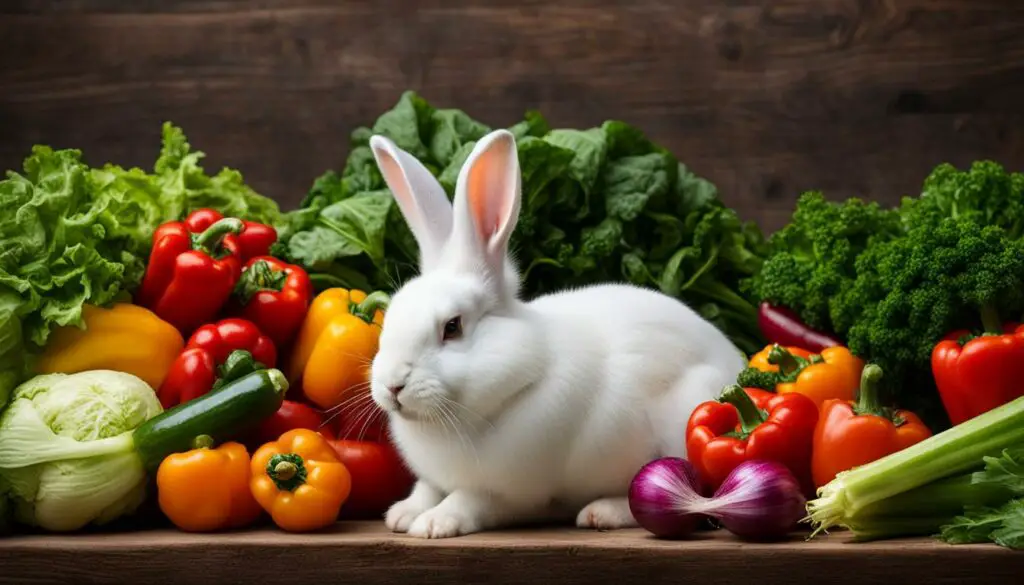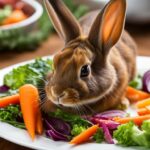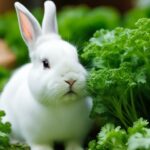As a bunny owner, one of the most important responsibilities is to ensure a safe and nutritious diet for your furry friend. While rabbits can enjoy a wide range of vegetables, it’s crucial to understand which foods are suitable and which should be avoided. In this guide, I will discuss the topic of rabbits and onions, shedding light on whether it is safe for rabbits to eat onions and the potential health risks involved.
Key Takeaways:
- Onions are toxic to rabbits and should never be included in their diet.
- Onions contain compounds that can damage a rabbit’s red blood cells and lead to anemia.
- Keep your rabbit’s diet focused on hay, pellets, and safe vegetables that promote their overall health.
- Consult with a veterinarian or experienced rabbit owners for a list of vegetables that are safe for your bunny.
- Always prioritize your rabbit’s well-being and provide them with a balanced and nutritious diet.
The Rabbit Diet: Vegetables for Rabbits
A rabbit’s diet should primarily consist of hay, pellets, and fresh vegetables. While vegetables are an important part of a rabbit’s diet, it’s crucial to make sure they are safe and appropriate for rabbits to eat. Onions should be completely avoided as they can have harmful health effects on rabbits. It’s important for bunny owners to provide a balanced and nutritious diet for their furry friends, focusing on safe vegetables that are beneficial for their overall health and well-being.
When it comes to choosing vegetables for rabbits, there are some safe options to consider. Lettuce (excluding iceberg lettuce), herbs such as parsley, cilantro, dill, and basil, and other leafy greens can be included in a rabbit’s daily diet. These veggies should be provided in appropriate portions, with about 15-20% of the rabbit’s overall diet consisting of vegetables. It’s important to note that onions, whether cooked or raw, should never be fed to rabbits due to their toxic nature.
To ensure that rabbits receive a well-rounded diet, it’s also essential to provide a variety of vegetables. Some vegetables should be fed sparingly, typically 1-2 times a week, due to their higher richness and potential for causing soft stools. These vegetables include kale, carrot tops, Swiss chard, and dandelion greens. It’s important to offer a mix of different vegetables to provide optimal nutrition for rabbits.
Remember, each rabbit may have unique dietary needs and sensitivities, so it’s crucial to observe their individual reactions and adjust their diet accordingly. By providing a balanced and rabbit-friendly diet, owners can ensure their furry companions stay healthy and happy.
Suitable Greens for Rabbits
When it comes to choosing vegetables for rabbits, there are some safe options to consider. Lettuce (excluding iceberg lettuce), herbs such as parsley, cilantro, dill, and basil, and other leafy greens can be included in a rabbit’s daily diet. These veggies should be provided in appropriate portions, with about 15-20% of the rabbit’s overall diet consisting of vegetables. It’s important to note that onions, whether cooked or raw, should never be fed to rabbits due to their toxic nature.
Safe Vegetables for Rabbits
- Lettuce (excluding iceberg lettuce)
- Parsley
- Cilantro
- Dill
- Basil
- Other leafy greens
Rabbits have sensitive digestive systems, so it’s essential to introduce new vegetables gradually and monitor their reactions. Some rabbits may have individual sensitivities, so it’s crucial to keep an eye out for any signs of discomfort or digestive issues. If a rabbit shows any adverse reactions to certain vegetables, it’s best to eliminate them from their diet.
Remember, variety is key when it comes to offering vegetables to rabbits. Providing a mix of different greens ensures a well-rounded and balanced diet. It’s important to wash vegetables thoroughly before feeding them to rabbits to remove any pesticides or contaminants. Additionally, always consult with a veterinarian before making any significant changes to your rabbit’s diet.
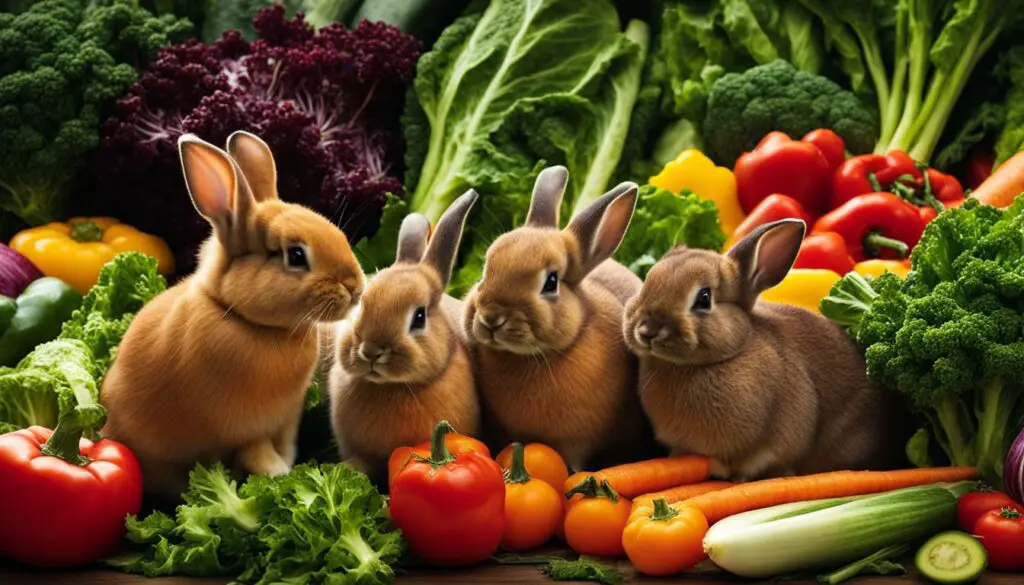
Table: Safe Vegetables for Rabbits
| Veggies | Quantity |
|---|---|
| Lettuce (excluding iceberg lettuce) | 1-2 cups per 6 pounds of body weight |
| Parsley | A few sprigs |
| Cilantro | A few sprigs |
| Dill | A few sprigs |
| Basil | A few leaves |
| Other leafy greens (e.g., kale, spinach) | Offer in moderation, as excessive amounts can cause digestive issues |
Debate on Suitable Vegetables for Bunnies
When it comes to the topic of vegetables for rabbits, there is a ongoing debate within the rabbit community. While some reputable sources suggest including certain vegetables in a rabbit’s diet, personal experiences and observations from experienced rabbit owners may provide different perspectives.
One vegetable that sparks debate is broccoli. While it is known to be a nutritious vegetable for humans, some rabbit owners believe that its higher starch content and potential for causing digestive issues make it a vegetable to be limited or avoided in a rabbit’s diet. The same concerns apply to cabbage, cauliflower, and brussel sprouts. These vegetables, although considered safe in small quantities by some sources, have been reported to cause gas and bloating in certain rabbits.
“I have personally noticed that my rabbit doesn’t do well with broccoli. It gives him loose stools and seems to upset his stomach,” said Jane, an experienced rabbit owner.
“I prefer to stick to leafy greens like kale and spinach, but I always feed them in moderation and only as part of a balanced diet.”
| Vegetable | Pros | Cons |
|---|---|---|
| Broccoli | Nutritious, high in fiber | Potential for gas and bloating |
| Cabbage | Good source of vitamins and minerals | Can cause gas and bloating |
| Cauliflower | Contains antioxidants and fiber | Potential for digestive issues |
| Brussel Sprouts | Rich in vitamins and minerals | May cause gas and bloating |
It is essential to remember that each rabbit is unique, and what works for one may not work for another. It’s always a good idea to consult with a veterinarian to ensure that the vegetables you include in your rabbit’s diet are suitable for their specific needs and health conditions.
The Importance of Sensitive Gut Considerations
When it comes to rabbits’ diet, it is crucial to consider their individual needs and sensitivities, especially regarding their gut health. While some rabbits can tolerate a wide variety of vegetables, others may have more sensitive guts and can only handle a limited selection. As a responsible bunny owner, it is essential to pay attention to your rabbit’s digestion and adjust their diet accordingly.
If you notice that your rabbit experiences regular soft or smelly poop, it may indicate that certain vegetables are causing digestive issues. Some vegetables that can contribute to loose stools in rabbits include kale, dandelion greens, Swiss chard, and carrot tops. To address this, it is recommended to reduce the frequency of feeding these vegetables and offer them once or twice a week instead.
“Each rabbit may have unique dietary needs and sensitivities. It’s crucial for bunny owners to be attentive to their rabbit’s individual needs and adjust their diet accordingly.
By monitoring your rabbit’s response to different vegetables and adjusting their diet accordingly, you can help support their digestive health and overall well-being. Remember that each rabbit is unique, and what works for one may not work for another. Consulting with a veterinarian experienced in rabbit care can also provide valuable guidance in understanding your rabbit’s sensitive gut considerations.

Bunny-Approved Vegetables and Herbs
As a responsible bunny owner, I understand the importance of providing my furry friend with a balanced and nutritious diet. When it comes to vegetables and herbs, there are a variety of options that are generally safe for rabbits to consume. These bunny-approved vegetables and herbs not only add variety to their diet but also provide essential nutrients. Some of the bunny-approved vegetables and herbs include:
- Romaine lettuce
- Red or Green Leaf lettuce
- Escarole
- Endive
- Radicchio
- Arugula
- Wheatgrass
- Watercress
- Baby bok choy
- Fennel
- Basil
- Mint
- Dill
- Cilantro
- Oregano
- Thyme
- Rosemary
- Curly and Italian parsley
While there may be recommendations to limit parsley due to its oxalic acid content, many rabbits can safely consume parsley without any negative effects. These bunny-approved vegetables and herbs can be incorporated into your rabbit’s diet on a regular basis, providing them with a variety of flavors and textures to enjoy.
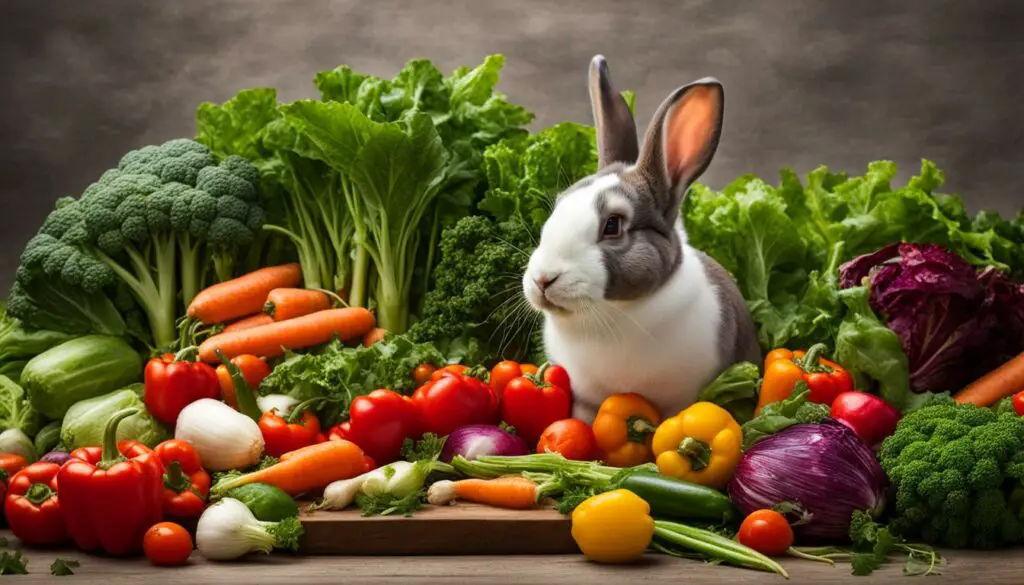
It’s important to remember that every rabbit is unique, and their dietary needs may vary. Some rabbits may have specific sensitivities or allergies, so it’s always a good idea to introduce new vegetables and herbs gradually and monitor their response. If you notice any digestive issues or changes in behavior, it’s best to consult with a veterinarian who specializes in rabbit care.
Providing a Balanced Diet
When including vegetables and herbs in your rabbit’s diet, it’s essential to maintain a balance and variety. These bunny-approved options should make up about 15-20% of your rabbit’s overall diet, with the majority consisting of hay and pellets. Remember to wash all vegetables thoroughly and remove any wilted or spoiled parts before feeding them to your rabbit. It’s also important to introduce new vegetables one at a time, allowing your rabbit’s digestive system to adjust.
Offering Healthy Treats
In addition to their regular diet, rabbits can enjoy healthy treats in moderation. Fresh fruits and small amounts of dried hay-based treats can be given as occasional rewards. It’s important to avoid sugary treats and stick to natural options. Always remember that treats should complement their diet and not replace their main sources of nutrition.
| Treats to Give | Treats to Avoid |
|---|---|
| Apple slices | Chocolate |
| Blueberries | Cookies |
| Slice of banana | Crackers |
| Papaya chunks | Bread |
| Small piece of pineapple | Cake |
| Strawberries | Muffins |
I believe in providing my rabbit with a diet that meets all of its nutritional needs. By including bunny-approved vegetables and herbs in their diet and offering healthy treats in moderation, I ensure that my furry friend enjoys a well-rounded and balanced diet. It’s important to remember that each rabbit is unique, so it’s always a good idea to consult with a veterinarian for personalized dietary advice.
Veggies to Feed Sparingly
While there are many safe and healthy vegetables for rabbits to enjoy, some should only be fed in limited quantities. These vegetables are generally higher in richness or can potentially cause soft stools if given in excess. It’s important to provide a balanced diet for rabbits and offer a variety of vegetables to ensure optimal nutrition. Here are some veggies that should be fed sparingly:
- Kale: Kale is a nutritious leafy green, but it should be given in moderation. Due to its higher calcium content, excessive consumption of kale can lead to bladder issues in rabbits. Feed kale to your bunny 1-2 times a week to avoid any potential problems.
- Carrot and Beet Tops: The leafy greens from carrots and beets can be given to rabbits, but in limited amounts. These greens are rich in nutrients, but too much can cause loose stools. Offer carrot and beet tops as an occasional treat, not as a regular staple.
- Swiss Chard: Swiss chard is another leafy green that rabbits can enjoy, but it should be fed sparingly. This vegetable is high in oxalic acid, which can interfere with calcium absorption. Limit Swiss chard to 1-2 times a week to maintain a healthy diet for your bunny.
- Dandelion Greens: Dandelion greens are a favorite for many rabbits, but they should also be given in moderation. These greens can have a laxative effect if fed in excess. Offer dandelion greens as an occasional treat, ideally 1-2 times a week.
Remember, the key to a healthy rabbit diet is variety and moderation. While these vegetables can be included in your bunny’s diet, it’s important to balance them with other safe options and not overfeed. Providing a mix of different vegetables will ensure that your rabbit receives a well-rounded and nutritious diet.
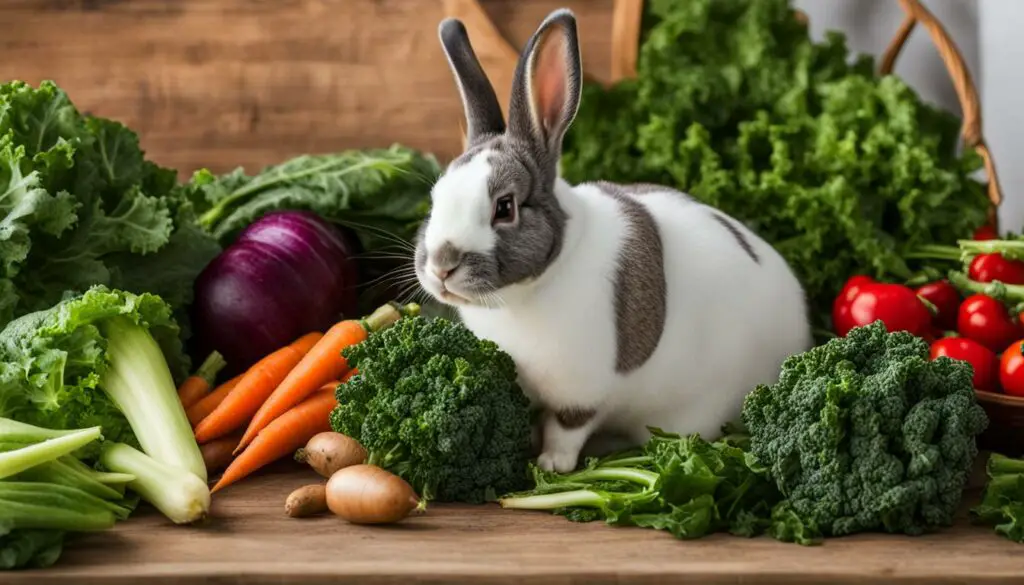
Foods to Avoid Feeding Rabbits
As a responsible bunny owner, it’s essential to be aware of the foods that are toxic to rabbits and should be completely avoided in their diet. Onions, garlic, leeks, chives, and all other plants in the onion family are highly toxic for rabbits and can cause severe health issues. These foods contain compounds that can damage a rabbit’s red blood cells, leading to anemia and other health complications. It’s crucial to keep these foods away from your furry friend to ensure their well-being and prevent any potential harm.
Additionally, it’s important to steer clear of processed foods when feeding rabbits. Items like chocolate, cookies, crackers, bread, cake, muffins, chips, popcorn, yogurt, honey, pasta, and candy should never be given to rabbits. These foods are not part of their natural diet and can cause digestive problems and other health issues. It’s best to stick to a diet of hay, pellets, and fresh vegetables that are safe and appropriate for their specific nutritional needs.
“Onions, garlic, leeks, chives, and all other plants in the onion family are highly toxic for rabbits.”
The Dangers of Onions
Onions, in particular, are especially harmful to rabbits. They contain compounds called thiosulfates, which can cause oxidative damage to a rabbit’s red blood cells. This can lead to a condition known as Heinz body anemia, where the damaged red blood cells are unable to transport oxygen effectively throughout the body. Symptoms of onion poisoning in rabbits may include weakness, lethargy, pale gums, decreased appetite, and difficulty breathing.
| Foods to Avoid | Reasons |
|---|---|
| Onions | Contain compounds that damage red blood cells |
| Garlic, leeks, chives | Contain similar toxic compounds as onions |
| Processed foods | Not part of a rabbit’s natural diet; can cause digestive issues |
“Onions can cause oxidative damage to a rabbit’s red blood cells, leading to anemia.”
It’s crucial to be vigilant about what you feed your pet rabbit and ensure their diet consists of safe and nutritious foods. If you suspect that your rabbit has ingested any toxic foods or is showing signs of illness, it’s important to seek veterinary assistance immediately. By providing your bunny with a well-balanced diet and avoiding harmful foods, you can help ensure their health and happiness for years to come.
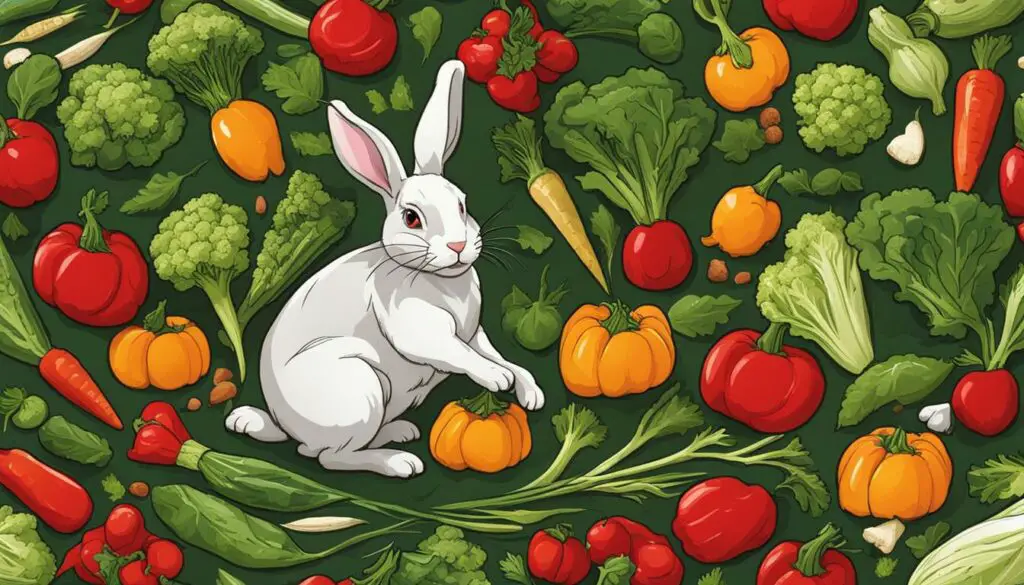
Tips for Providing Rabbit-Friendly Vegetables
As a responsible bunny owner, it’s important to provide your furry friend with a diet that is safe, nutritious, and enjoyable. When it comes to selecting vegetables for your rabbit, there are a few tips that can help ensure you are offering the best options. Here are some guidelines to keep in mind:
- Choose safe vegetables: Stick to rabbit-friendly vegetables that are known to be safe for consumption. This includes a variety of leafy greens such as Romaine lettuce, arugula, and watercress. Other rabbit-approved options include baby bok choy, fennel, and various herbs like basil, mint, dill, and parsley.
- Ensure freshness and quality: When purchasing vegetables for your bunny, it’s important to choose fresh, high-quality produce. Visiting local farmer markets or speaking to the produce manager at your grocery store can help you find affordable and fresh options. Be sure to inspect the vegetables for any signs of wilting or damage before offering them to your rabbit.
- Introduce new vegetables gradually: Rabbits have sensitive digestive systems, so it’s important to introduce new vegetables gradually. Start by offering small amounts of a new vegetable and observe your rabbit’s reaction and digestion. If there are no negative effects, you can gradually increase the portion size.
- Avoid toxic vegetables: Certain vegetables are toxic to rabbits and should be avoided. Onions, in particular, are highly toxic and can cause severe health issues. Make sure to never include onions or any other members of the onion family in your rabbit’s diet.
By following these tips, you can provide your rabbit with a variety of safe and nutritious vegetables that contribute to their overall health and well-being. Remember to consult with your veterinarian for specific dietary recommendations based on your rabbit’s individual needs.
Sample Table: Safe Vegetables for Rabbits
| Vegetable | Notes |
|---|---|
| Romaine Lettuce | A leafy green that is safe and enjoyed by many rabbits. |
| Arugula | A peppery leafy green that can add variety to your rabbit’s diet. |
| Baby Bok Choy | A crunchy vegetable that offers both flavor and texture. |
| Basil | A fragrant herb that rabbits often find appealing. |
| Watercress | A leafy green with a slightly spicy taste that many rabbits enjoy. |
Remember to always consult with your veterinarian for personalized advice and recommendations regarding your rabbit’s diet. Ensuring a safe and well-balanced diet will contribute to your rabbit’s overall health and happiness.
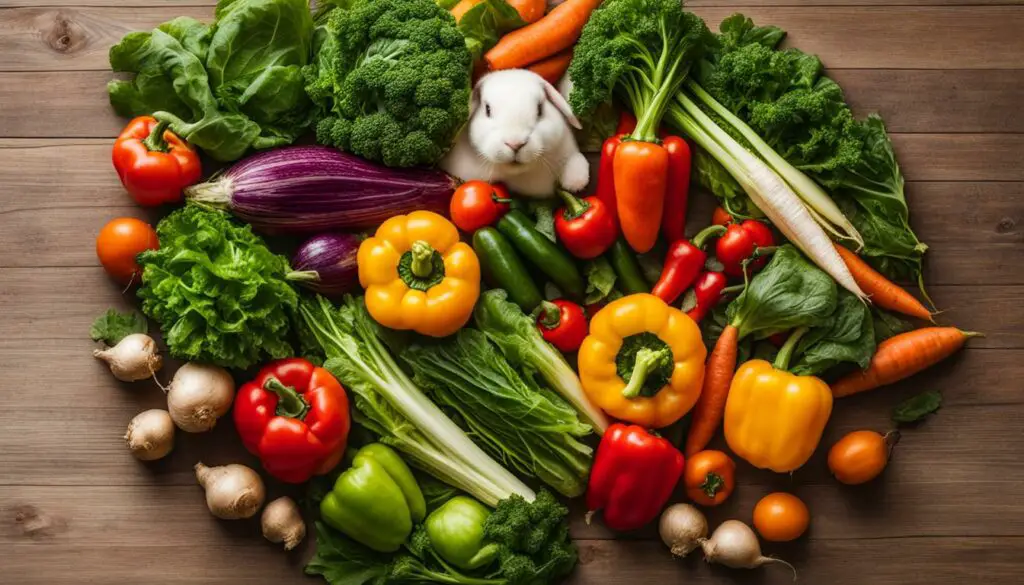
Treating Rabbits with Healthy and Safe Options
As responsible bunny owners, it’s important for us to treat our furry friends with healthy and safe options. While rabbits do have a sweet tooth, it’s crucial to provide them with treats that are nutritious and won’t upset their sensitive digestive systems. Dried hay-based treats and fresh fruits and vegetables can be suitable options for rabbit treats, but moderation is key. Too many sweet treats can lead to health issues, so it’s best to offer them in small amounts.
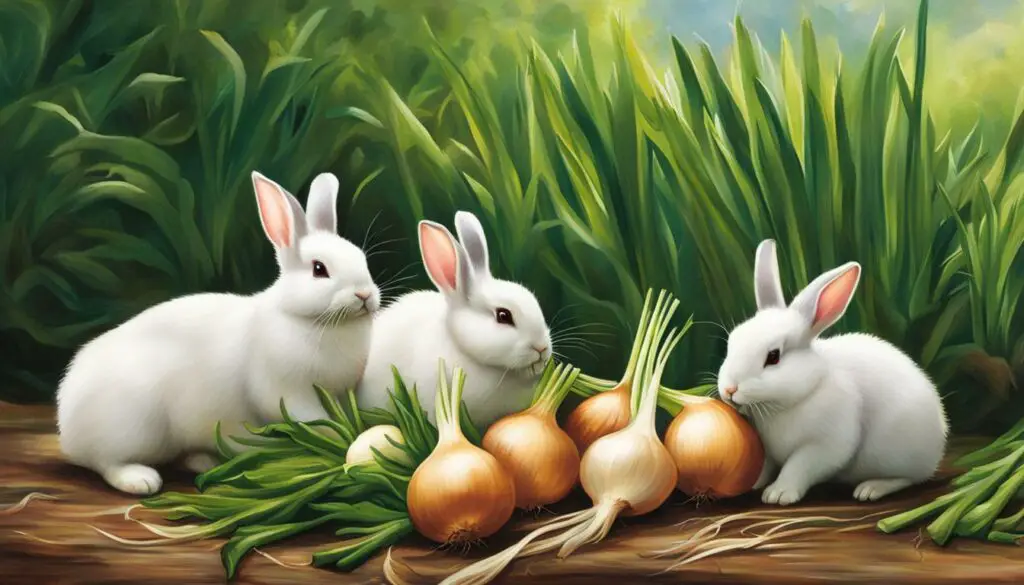
When selecting commercially available treats, it’s important to choose those made with natural and nutritious ingredients. Avoid treats that contain processed foods, excessive sugars, or artificial additives. Reading the labels and researching the brand’s reputation can help ensure that the treats are of high quality and safe for our bunnies to enjoy. Remember, treats should never replace a balanced and nutritious diet, but rather be a small addition to their overall nutrition.
By providing our rabbits with treats that are healthy and safe, we can show them our love and affection while also promoting their well-being. Just like with any aspect of their diet, it’s essential to be mindful of the portion sizes and frequency of treats, tailoring them to meet the individual needs and sensitivities of our beloved bunnies.
What Do Wild Rabbits Normally Eat?
Wild rabbits have a diverse and natural diet that mainly consists of plant materials. They are skilled foragers and have adapted to consume a wide variety of vegetation found in their habitats. Grasses, weeds like dandelions and clover, bark and twigs from various types of trees and shrubs, flowers, and herbs are all part of a wild rabbit’s typical diet.
While fruits and vegetables can be a part of their diet when available, they make up a smaller portion compared to leafy plants and grasses. Wild rabbits consume these plant materials to obtain the necessary nutrients for their survival and overall health. Their natural diet ensures they receive a balanced mix of vitamins, minerals, and fiber.
It’s important to note that wild rabbits don’t have access to a wide variety of food throughout the year. During winter, when plant life is scarce, their diet may change to include bark, twigs, and evergreen or pine needles from trees and shrubs that survive the winter. This adaptation helps them sustain themselves when their usual food sources are limited.
Example Table: Comparison of Wild Rabbit Diet and Domestic Rabbit Diet
| Food | Wild Rabbits | Domestic Rabbits |
|---|---|---|
| Grasses | High consumption | High consumption |
| Weeds and Wildflowers | High consumption | Limited consumption |
| Tree Bark and Twigs | Winter food source | Not a significant part of the diet |
| Leafy Vegetables | Occasional consumption | Daily consumption |
| Root Vegetables | Occasional consumption | Rare consumption |
| Fruits | Occasional consumption | Moderate consumption |
As wild rabbits have their own natural foraging habits, it’s important to remember that they have adapted to finding suitable food sources on their own. While it may be tempting to provide supplementary food to wild rabbits, it’s generally best to allow them to rely on their natural instincts and resources. By creating suitable habitats with a variety of vegetation, we can support their foraging behaviors and ensure their overall well-being.

Wild Rabbit Diet in Winter
During the winter months, wild rabbits face a challenge in finding enough food to sustain themselves. With limited plant life available, they must adapt their diet and rely on alternative food sources to survive.
When natural vegetation becomes scarce, wild rabbits may turn to bark, twigs, and even evergreen or pine needles from trees and shrubs that are able to withstand the winter months. These sources provide some nourishment for rabbits, although they may not be as nutritionally rich as their usual diet.
The scarcity of food during winter can pose a significant challenge for wild rabbits, and they must rely on their ability to find and utilize whatever resources are available to them. This adaptability is crucial for their survival during the colder months.
| Food Source | Availability | Importance in Winter Diet |
|---|---|---|
| Grasses | Scarce | Low |
| Weeds (e.g., dandelions, clover) | Scarce | Medium |
| Bark and Twigs | Available | High |
| Evergreen or Pine Needles | Available | Medium |
| Flowers and Herbs | Scarce | Low |
While wild rabbits strive to find enough food to survive during winter, it’s important to remember that they are equipped with natural instincts for foraging and have adapted to their environment. As humans, it is best to avoid directly feeding wild rabbits to prevent dependency and disruption of their natural behaviors. Instead, providing appropriate greenery and plants that can survive the winter can offer them a more sustainable and natural food source.

In conclusion, wild rabbits face the challenge of finding adequate food during the winter months when their usual sources of nutrition are scarce. They adapt by consuming bark, twigs, and evergreen or pine needles, which provide some nourishment when fresh vegetation is limited. However, their natural instincts for foraging enable them to survive in challenging conditions. As responsible observers, we can support wild rabbits by creating and maintaining habitats with year-round plantings that can sustain them during the winter. This allows them to rely on their natural foraging behaviors and find adequate nutrition without dependence on human-provided food.
Feeding Wild Rabbits: Considerations and Tips
Feeding wild rabbits can be a tempting thought for animal lovers who want to help these adorable creatures. However, it’s important to consider the impact of providing supplementary food to wild rabbits and the potential risks involved. While rabbits are herbivores and consume a variety of plant materials in their natural habitats, introducing human-provided food can disrupt their natural foraging behavior and lead to dependency on humans for sustenance.

To support wild rabbits without disrupting their natural behavior, a better approach is to create a rabbit-friendly environment by planting a variety of shrubs and greenery that will thrive throughout the year. This provides them with a natural food source and encourages their foraging instincts. Some suitable shrubs and plants include clover, dandelions, and various types of grasses. By promoting a diverse and sustainable ecosystem in your yard or garden, you can help wild rabbits find the food they need to thrive.
Table: Plants to Attract Wild Rabbits
| Plant | Description |
|---|---|
| Clover | A common wild plant that rabbits enjoy grazing on. |
| Dandelions | The flowers, leaves, and roots of dandelions are all edible for rabbits. |
| Grasses | Various grasses like Timothy grass, ryegrass, and Bermuda grass are favorites of wild rabbits. |
| Plantain | Both broadleaf and narrowleaf plantain are nutritious for rabbits. |
| Chickweed | Small, leafy plant that rabbits find tasty. |
Remember that wild rabbits are adapted to finding suitable food sources on their own, regardless of the time of year. Providing a healthy and natural environment with abundant plant life is the best way to support their nutritional needs without interfering with their natural behaviors. By respecting and preserving their wild nature, we can ensure the well-being of these enchanting creatures.
Conclusion
After exploring the topic of whether rabbits can eat onions, it is clear that including onions in a rabbit’s diet is a big no-no. Onions contain compounds that can be highly toxic to rabbits, causing damage to their red blood cells and leading to serious health issues, including anemia. As a responsible bunny owner, it’s crucial to be aware of the dangers of feeding onions to rabbits and ensure they are completely avoided.
When it comes to a rabbit’s diet, the focus should be on providing a balanced and nutritious mix of hay, pellets, and fresh vegetables. While vegetables are an important part of a rabbit’s diet, it’s essential to choose safe options that are suitable for their digestive system. Onions, whether cooked or raw, should never make it onto their plate, as they can have harmful health effects.
Some vegetables that are generally safe for rabbits to eat include various types of lettuces, herbs like parsley and basil, and other leafy greens. However, it’s important to remember that each rabbit may have unique dietary needs and sensitivities. Some vegetables, like kale and dandelion greens, should be fed sparingly due to their higher richness and potential for causing soft stools.
In conclusion, onions and other toxic foods should be strictly avoided in a rabbit’s diet, while safe vegetables and herbs can be included in moderation. By providing a suitable and nutritious diet, rabbit owners can ensure the health and well-being of their furry friends.
FAQ
Can rabbits eat onions?
No, onions are toxic to rabbits and should be avoided in their diet.
Why are onions harmful to rabbits?
Onions contain compounds that can damage a rabbit’s red blood cells, leading to anemia and other health issues.
What should a rabbit’s diet consist of?
A rabbit’s diet should primarily consist of hay, pellets, and fresh vegetables.
What vegetables are safe for rabbits to eat?
Lettuce (excluding iceberg lettuce), herbs such as parsley, cilantro, dill, and basil, and other leafy greens are safe for rabbits to eat.
Can rabbits eat cooked onions?
No, both cooked and raw onions should be avoided as they are toxic to rabbits.
Are there any vegetables that should be fed to rabbits sparingly?
Yes, vegetables such as kale, carrot and beet tops, Swiss chard, and dandelion greens should be fed in limited quantities due to their higher richness.
What foods should be completely avoided in a rabbit’s diet?
Onions, garlic, leeks, chives, and all other plants in the onion family should be avoided. Additionally, processed foods and foods that are not part of their natural diet, such as chocolate, cookies, crackers, bread, cake, and meat, should not be given to rabbits.
How can I find affordable vegetables for my rabbit?
Visiting farmer markets, speaking to the produce manager at local grocery stores, or exploring smaller, local markets can help you find affordable and fresh vegetables for your rabbit.
What are suitable treats for rabbits?
Dried hay-based treats and fresh fruits and vegetables, in small amounts, can be suitable treats for rabbits. It’s important to avoid giving them too many sweet treats.
What do wild rabbits normally eat?
Wild rabbits typically consume a wide variety of plant materials, including grasses, weeds, bark, twigs, flowers, and herbs.
How can I provide for wild rabbits without directly feeding them?
Planting shrubs and greenery that will survive through the winter can provide natural food resources for wild rabbits. Growing plants year-round can also offer nutritious options for them.
What should I consider when feeding wild rabbits?
While supplementary food can be offered, it’s important to avoid disrupting their natural foraging behavior and attracting other wild animals to the yard.

